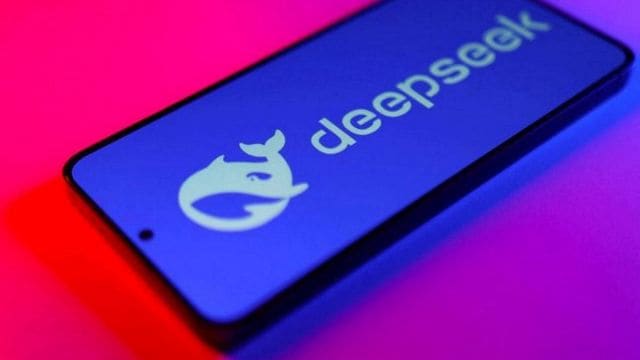Tech giants race to offer DeepSeek R1 on cloud services as demand for open AI rises
Microsoft, Nvidia, and AWS look to ride on DeepSeek’s popularity by offering the AI reasoning model R1 through various channels.
 The Deepseek logo is seen in this illustration taken on January 29, 2025. REUTERS/Dado Ruvic/Illustration/File Photo
The Deepseek logo is seen in this illustration taken on January 29, 2025. REUTERS/Dado Ruvic/Illustration/File PhotoDeepSeek has witnessed a surge in popularity since the release of its AI reasoning model R1, with several tech giants such as Microsoft, Nvidia, and Amazon Web Services (AWS) rushing to bring the open-source AI model into the fold of their respective cloud services.
In India too, Union Minister of Information and Technology Ashwini Vaishnaw praised the progress made by the Chinese AI startup and said that its large language models (LLMs) will be hosted on domestic servers in India.
“Data privacy issues regarding DeepSeek can be addressed by hosting open source models on Indian servers,” Vaishnaw reportedly said at an industry conference. According to the minister, DeepSeek’s models is likely to be hosted on India’s new AI Compute Facility that is scheduled to begin operations “in the coming days,” with 10,000 GPUs ready for deployment.
Meanwhile, Indian AI startup Krutrim founded by Ola CEO Bhavish Aggarwal announced that R1 is accessible to developers via Krutrim Studio at a price of Rs 45 per million tokens.
“India can’t be left behind in AI. @Krutrim has accelerated efforts to develop world-class AI. As a first step, our cloud now has DeepSeek models live, hosted on Indian servers. Pricing lowest in the world,” Aggarwal said in a post on X on Friday, January 31.
Besides Krutrim, here are a few tech giants that have sought to ride on DeepSeek’s popularity by offering its partially open-source AI models through various channels.
Microsoft
Microsoft on Wednesday, January 29, announced that R1 is available on Azure AI Foundry as well as GitHub. Azure AI Foundry is a Microsoft-owned platform that offers a number of AI services for enterprises, according to a report by TechCrunch.
The version of R1 hosted on Azure AI Foundry has undergone rigorous red teaming and safety evaluations, including automated assessments of model behaviour and extensive security reviews to mitigate potential risks, Microsoft claimed in a blog post.
“As we continue expanding the model catalog in Azure AI Foundry, we’re excited to see how developers and enterprises leverage […] R1 to tackle real-world challenges and deliver transformative experiences,” the software giant said.
Microsoft further said that customers with Copilot+ PCs will soon be able to run “distilled” versions of R1 locally on their devices.
Interestingly, Microsoft’s embrace of DeepSeek’s AI models follows allegations by its marquee AI investment, OpenAI, that the Chinese AI startup copied from its technology by using its GPT models to train its own.
Nvidia
Nvidia announced on Thursday, January 30, that DeepSeek-R1 is live on its NIM microservice. Nvidia NIM is the chip giant’s software platform designed to streamline the deployment of custom and pre-trained AI models.
“To help developers securely experiment with these capabilities and build their own specialized agents, the 671-billion-parameter DeepSeek-R1 model is now available as an NVIDIA NIM microservice preview on build.nvidia.com,” Nvidia said in a blog post.
“The DeepSeek-R1 NIM microservice can deliver up to 3,872 tokens per second on a single NVIDIA HGX H200 system,” it said.
Nvidia also said that developers will also be able to access R1 through an API soon. “Using NVIDIA AI Foundry with NVIDIA NeMo software, enterprises will also be able to create customized DeepSeek-R1 NIM microservices for specialized AI agents,” it further said.
Amazon Web Services
Cloud giant Amazon Web Services (AWS) has joined Microsoft and Nvidia in enabling DeepSeek’s foundational R1 model to be used within its AI platform Amazon Bedrock and Amazon Sagemaker.
“We’ve always been focused on making it easy to get started with emerging and popular models right away, and we’re giving customers a lot of ways to test out DeepSeek AI,” said AWS CEO Matt Garman in a LinkedIn post.
“Customers can run the distilled Llama and Qwen DeepSeek models on Amazon SageMaker AI, use the distilled Llama models on Amazon Bedrock with Custom Model Import, or train DeepSeek models with SageMaker via Hugging Face,” he added.
Earlier this month, AWS launched its own AI video generation model called Luma. It also announced plans to expand cloud computing capacity in India by investing $8.3 billion for building out cloud and AI infrastructure in Maharashtra.







